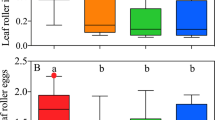Abstract
Flowering Rorippa indicaplants are attended by ants that collect nectar and, at the same time, prey on herbivorous insects, including larvae of the diamondback moth, Plutella xylostella.Here, we showed that P. xylostellalarvae suffered higher predation on R. indicawhose flowers were accessible by ants than on plants those whose flowers were inaccessible. Ants showed equal predation preference between unparasitized and larvae parasitized by Cotesia plutellae,a dominant specialist parasitic wasp of P. xylostellalarvae. C. plutellaepreferred non-flowering, host-infested R. indicato flowering, host infested R. indica.Based on these results, we infer that the preference of C. plutellaefor non-flowering, host-infested plants is in part explained by the avoidance of intraguild predation by attending ants.
Similar content being viewed by others
References
Brodeur, J., and McNeil, J. N. (1989). Seasonal microhabitat selection by an endoparasitoid through adaptive modification of host behavior. Science 244: 226–228.
Brodeur, J., and Vet, L. E. M. (1994). Ursurpation of host behaviour by a parasitic wasp. Anim. Behav. 48: 187–192.
Jones, R. E. (1987). Ants, parasitoids, and the cabbage butterfly Pieris rapae. J. Anim. Ecol. 56: 739–750.
McAllister, M. K., and Roitberg, B. D. (1987). Adaptive suicidal behaviour in pea aphids. Nature 328: 797–799.
Muller, C. B. and Brodeur, J (2002). Intraguild predation in biological control and conservation biology. Biol. Control, (feature article) 25: 216–223.
Pallini, A., Janssen, A., and Sabelis, M. W. (1997). Odour-mediated responses of phytophagous mites to conspecific and heterospecific competitors. Oecologia 110: 179–185.
Polis, G. A., Myers, C. A., and Holt, R. D. (1989). The ecology and evolution of intraguild predation: Potential competitors that eat each other. Ann. Rev. Ecol. Syst. 20: 297–330.
Shiojiri, K., Takabayashi. J., Yano, S., and Takafuji, A. (2000). Flight response of parasitoids toward plant-herbivore complexes: A comparative study of two parasitoid-herbivore systems on cabbage plants. Appl. Entomol. Zool. 35: 87–92.
Singer, M. S., Rodrigues, D., Stireman, III J. O., and Carriére, Y. (2004). Roles of food quality and enemy-free space in host use by a generalist insect herbivore. Ecology 85: 2747–2753.
Sokal, R. R., and Rohlf, F. J. (1995). Biometry—The principles and practice of statistics in biological research, 3rd edn. W. H. Freeman and Company, New York.
Takizawa, T., Yasuda, H., and Agarwala Basant, K. (2000). Effect of three species of predatory ladybirds on oviposition of aphid parasitolds. Entomol. Science. 3: 465–469.
Yano, S. (1994a). Ecological and evolutionary interactions between wild ctucifers and their herbivorous insects. Plant Species Biology. 9: 137–143.
Yano, S. (1994b). Flower nectar of an autogamous perennial Rorippa indica as an indirect defense mechanisms against herbivorous insects. Res. Popul. Ecol. 36: 63–71.
Author information
Authors and Affiliations
Corresponding author
Rights and permissions
About this article
Cite this article
Shiojiri, K., Takabayashi, J. Parasitoid Preference for Host-Infested Plants Is Affected by the Risk of Intraguild Predation. J Insect Behav 18, 567–576 (2005). https://doi.org/10.1007/s10905-005-5613-y
Revised:
Accepted:
Issue Date:
DOI: https://doi.org/10.1007/s10905-005-5613-y




